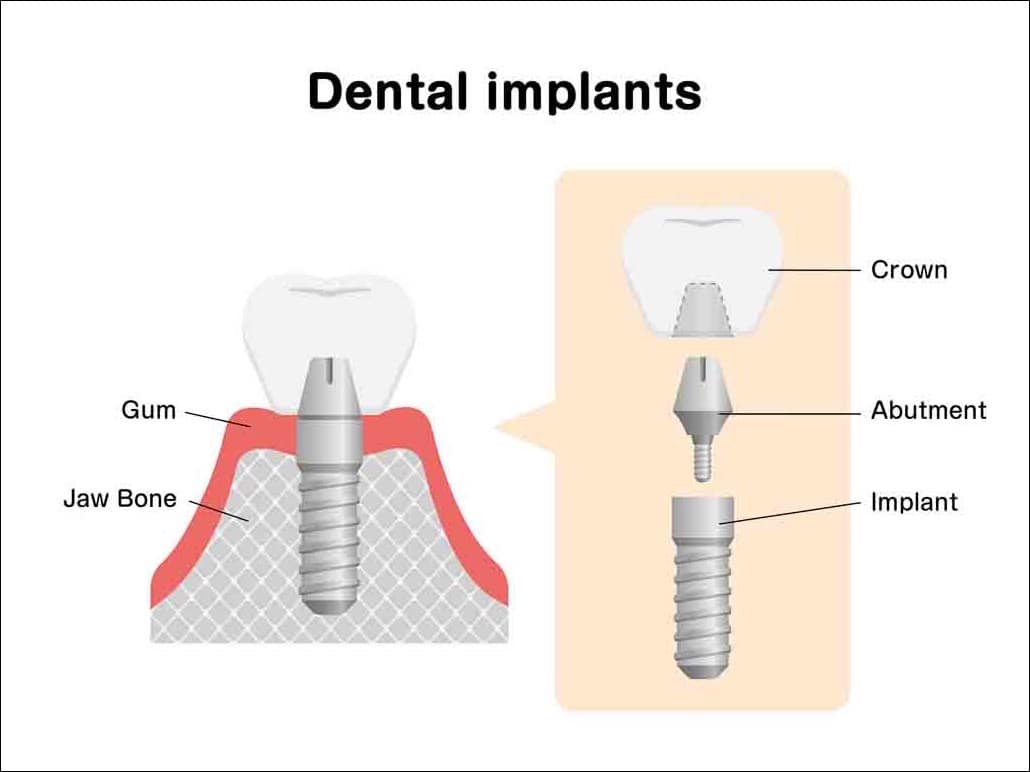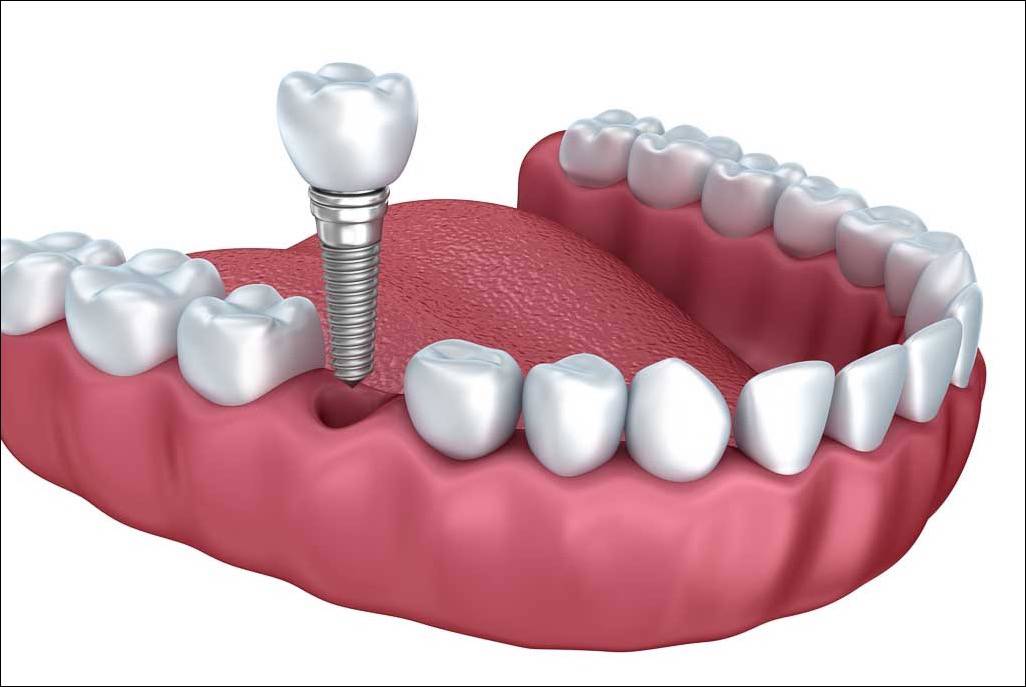A dental implants is a titanium based-prosthesis that provides patients with a highly successful, discreet and effective way at replacing their missing teeth. Their innovative design means that they are stronger and more durable than other tooth replacement solutions while ensuring that no pressure or damage is placed on surrounding teeth. Each dental implant consists of an artificial root in the form of a titanium implant that is placed into the jaw bone via a minor procedure. Once the implant heals in the bone, your general dentist can make you a beautiful porcelain crown and finish the tooth-replacement process.
A dental implant is made up of three parts: the first part is the implant itself, which is surgically placed in the bone (in the office = by us - your Brooklyn oral surgeon). The second part is the abutment - the part that connects the implant to the implant crown. The third and final part is the implant crown. It functions as a regular crown would on one of your natural teeth; it connects to the abutment, which then connects to the implant itself. The last two parts are completed by your general dentist.

The main advantage of dental implants is that they can replace missing teeth without affecting the neighboring teeth. For example, if you are missing a single tooth, one option could be for your dentist to drill the teeth in front and behind the space and place a three-unit bridge (that is cemented in place). Another option would be to have a removable denture or flipper-type device that replaces the missing tooth, and is removed at night.
A second important advantage of implants is that unlike real teeth, implants do not get decay. Thus, if you are faced with a decision to have a root canal, post and crown, or a dental implant, the implant is often the best option because it will almost always last longer.
The procedure to have an implant placed can often take less than 30 minutes. However, the time to go from start to finish (implant placement to completed crown) is usually in the 3 - 9 month range because of the time is takes for the implant to osseointegrate (fuse with the bone). If the amount of bone for placing the implant was limited, and a bone graft was placed, it may take a few months more, because the bone graft has to heal in place as well.

One of the great things about dental implants is that they can be used as a replacement for a missing tooth or teeth, and can also be used to replace an entire arch of teeth! For example, one of the most common and beneficial uses of dental implants is as an implant denture -- a denture that's held in with implants. Many patients who wear lower dentures struggle because of the way the lower jaw loses bone, and a traditional denture that's supported in part with dental implants can provide a world of difference for eating, smiling, and feeling confident in public again!
Many people mistakenly believe that a lack of healthy bone in their jaw means that dental implants are not possible. Fortunately, a bone grafting procedure can strengthen the jaw bone and enable virtually any patient to benefit from dental implants.
A: Many people mistakenly believe that a lack of healthy bone in their jaw means that dental implants are not possible. Fortunately, a bone grafting procedure can strengthen the jaw bone and enable virtually any patient to benefit from dental implants.
A: Dental implants have several advantages, such as improved appearance, speech, and comfort. They also offer better
oral health, as they do not require altering adjacent teeth, and they can last a lifetime with proper care.
A: Most adults with adequate bone density and healthy gums are good candidates for dental implants. A thorough
evaluation by an experienced Brooklyn oral surgeon like Dr. Ruvinsky will determine your eligibility for the procedure.
A: The dental implant process generally involves multiple steps: initial consultation and evaluation, planning and
imaging, surgical placement of the implant, a healing period allowing the implant to fuse with the bone
(osseointegration), and finally placement of the abutment and crown. The entire process can take several months.
A: Yes, dental implants are a well-established and safe treatment option. They have been used successfully for
decades. As with any surgical procedure, there are risks, but complications are rare and implants have a high
success rate when performed by qualified professionals.
A: Caring for dental implants is similar to caring for natural teeth. This includes regular brushing and flossing,
using antiseptic mouthwash if desired, and maintaining routine dental check-ups and cleanings. Proper oral hygiene is crucial to prevent infections and ensure the longevity of your implants.
A: The recovery time can vary depending on the individual and the complexity of the procedure. Generally, it takes a few days to a week to recover from the initial surgical placement of the implant. Complete healing and
osseointegration (where the implant fuses with the jawbone) can take several months.
A: The cost of dental implants can vary based on several factors including the number of implants needed, the
condition of your jawbone, and any additional treatments required. While dental implants tend to be more expensive upfront compared to other tooth replacement options, their long-lasting benefits and durability often make them a worthwhile investment. For an accurate estimate, a consultation with our team is necessary - but the good news is that many insurance plans cover some parts of the dental implant process.
A: Most patients report that the discomfort experienced during the dental implant procedure is similar to that of a
tooth extraction. Anesthesia and sedation options are available to ensure your comfort during the surgery.
Post-operative pain and swelling can usually be managed with over-the-counter pain medications and typically subside within a few days.

© 2021 New York Institute of Oral and Maxillofacial Surgery - HIPAA Notice / Privacy Policy - Terms - Accessibility Statement